One morning, just after dawn, I ventured into the forest with my binoculars and notepad, ready to record sightings. The sky was overcast, and a gentle drizzle had started, creating a serene atmosphere in the forest. As I navigated through the underbrush, I suddenly heard the unmistakable whoosh of large wings cutting through the moist air. The sound was immense, almost like the roar of wind through the trees, but I knew it was the flight of something extraordinary. Looking up, I was thrilled to see a magnificent Great Indian Hornbill flying from the thick forest canopy. Watching the hornbill fly away, I couldn’t help but feel a deep sense of wonder and appreciation for these creatures. With the gentle rain and the powerful flight of the hornbill, this moment was a poignant reminder of why I chose to dedicate my life to studying and conserving these remarkable birds and their habitats. This encounter with the Great Indian Hornbill, its flight sound resonating through the forest and its feathered beauty, etched in my memory, remains one of my most cherished experiences from the field, reinforcing my passion for ornithology and the importance of preserving our natural world.
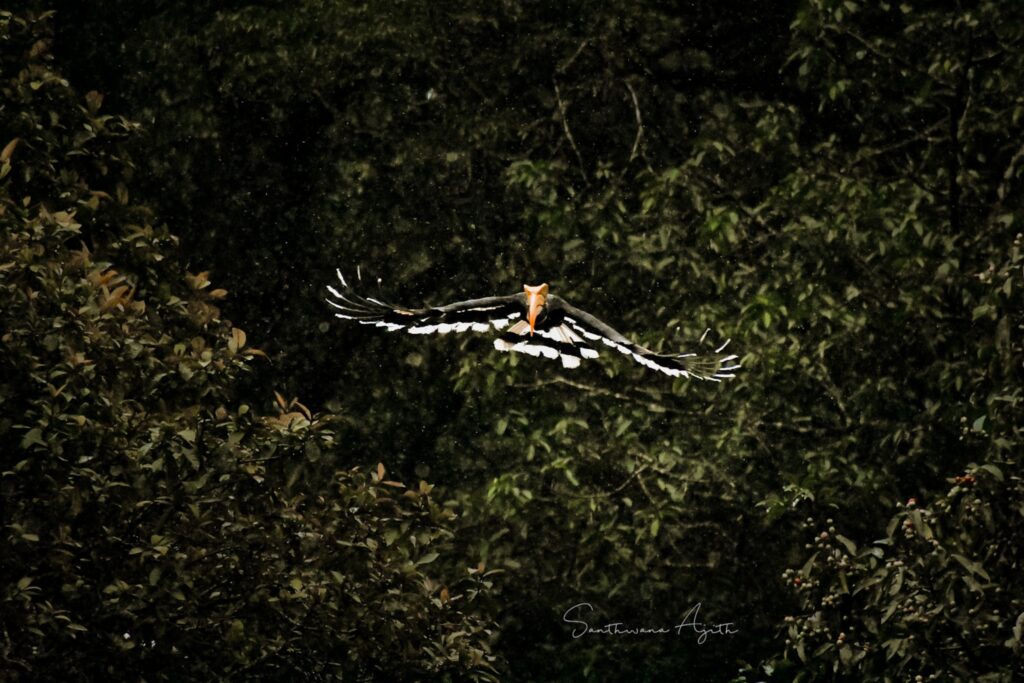 First encounter with the majestic hornbill, soaring gracefully through the canopy of Nelliyampathi Forest Reserve. A breathtaking moment etched in memory!
First encounter with the majestic hornbill, soaring gracefully through the canopy of Nelliyampathi Forest Reserve. A breathtaking moment etched in memory!
This is how my love for birds and nature took shape..
My interest in birds and nature began during my childhood. Growing up in rural Kannur, Kerala, near the coast, I was constantly surrounded by rich avian diversity, especially wetland birds, which deepened my passion for wildlife and ornithology. My family often took walks in the countryside, and I was fascinated by the diverse flora and fauna we encountered. However, it was a particular incident during a summer vacation that truly sparked my passion. I remember spending long hours in my grandparents’ garden, a haven for various birds. One day, I found a nest with a few tiny eggs hidden in a low shrub. I decided to watch over the nest, observing from a distance to avoid disturbing the birds. Over the weeks, I witnessed the eggs hatch into tiny chicks and eventually grow into fledglings of bulbuls. The entire process was mesmerizing, and I found myself deeply captivated by the lives of these birds.
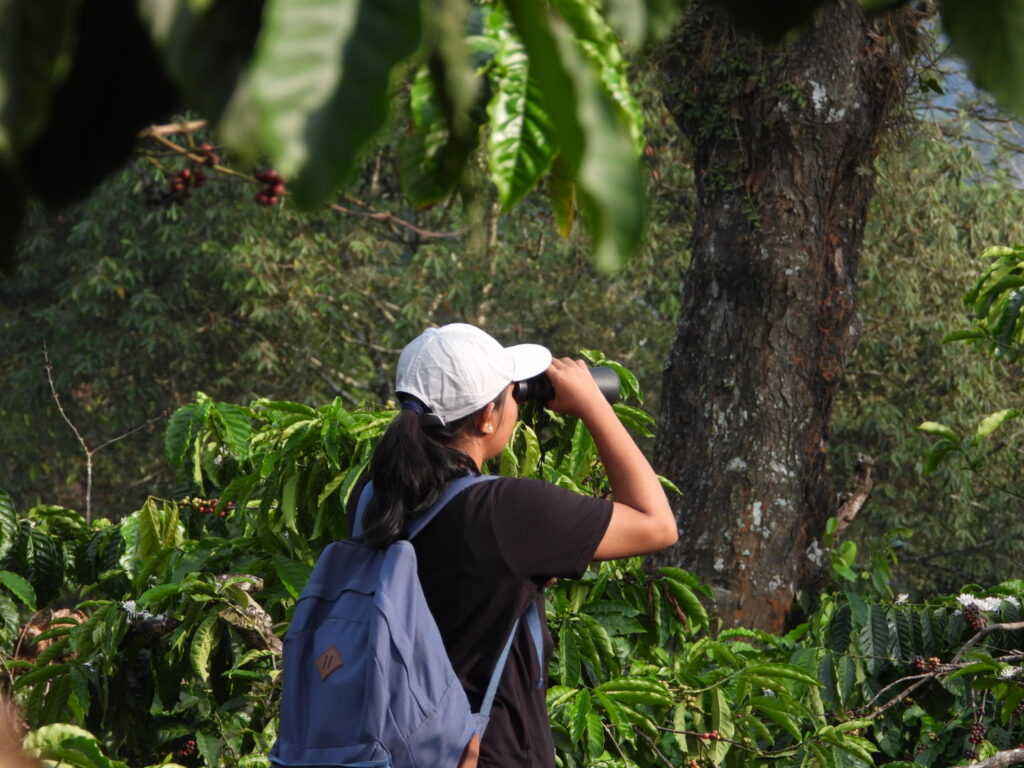 “Lost in the beauty of nature, one sighting at a time. Birdwatching: where every moment brings a new adventure!”
“Lost in the beauty of nature, one sighting at a time. Birdwatching: where every moment brings a new adventure!”
My interest in birds and nature translated into a research direction during my undergraduate studies. It was a gradual process, influenced by a series of experiences and opportunities that helped shape my academic and professional journey, which started during my undergraduate days. I joined various birding groups and participated in numerous field trips. These excursions allowed me to observe birds in their natural habitats, learn from experienced ornithologists, and engage in discussions about bird behavior and conservation. The practical experience and hands-on learning deepened my fascination with avian life and solidified my desire to pursue a career in this field. The pivotal moment came when I was doing my bachelors degree in Zoology from Govt. Brennen College, Dharmadam I researched avian diversity in the Dharmadam estuary for my final year dissertation. This research solidified my decision to pursue ornithology and wildlife conservation as my research of interest.
I completed my postgraduate studies in Zoology at Kongunadu Arts and Science College, Department of Zoology, Kongunadu Arts and Science College, Coimbatore where I developed a keen interest in ornithology. One of my professors, Dr. R Venkitachalam ignited my curiosity about the field, which ultimately inspired me to pursue a doctoral degree under his guidance. For my PhD, I am studying frugivorous birds and their role in seed dispersal and forest dynamics. My research aims to understand the intricate relationships between these birds and their ecosystems, exploring how they contribute to forest regeneration and biodiversity. Additionally, I have a keen interest in wildlife photography, which complements my research work. Capturing the beauty and behavior of frugivorous birds through the lens allows me to document and share my findings with a wider audience. My photographs serve as a visual record of the species I study, and help raise awareness about the importance of conservation.
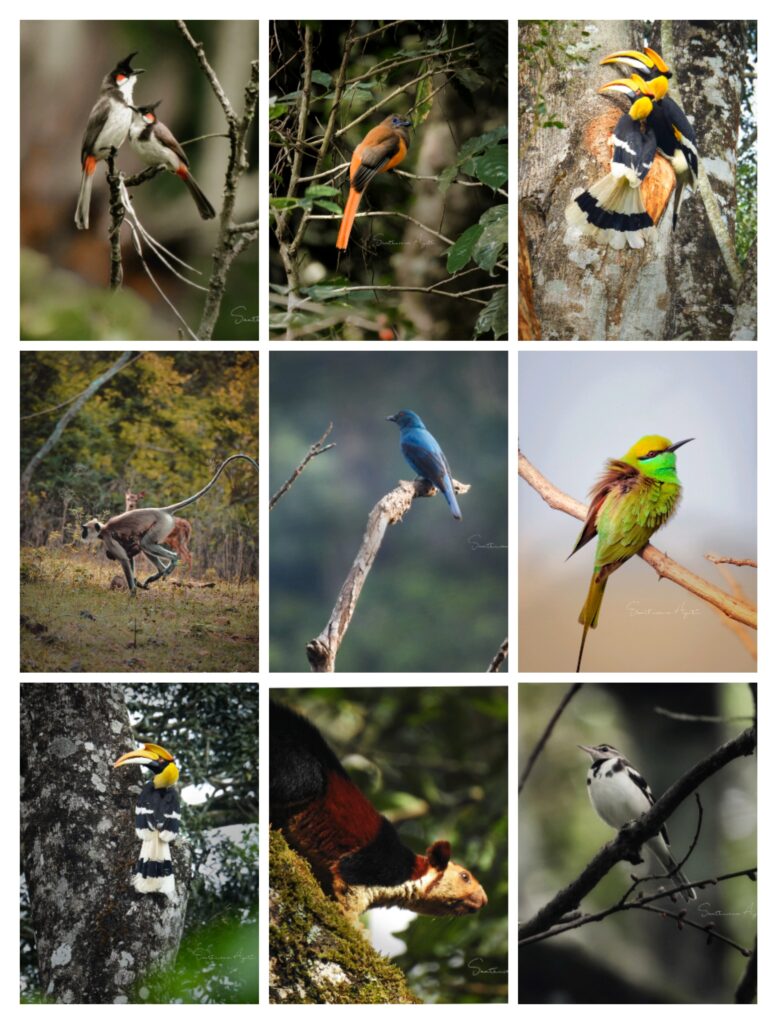 Through my lens: celebrating the beauty of wildlife in all its forms. Left to right, top to bottom: ed-whiskered Bulbul, Malabar Trogon, a pair of Great Indian Hornbills, Nilgiri Langur with its baby, Asian Fairy Bluebird, Asian Green Bee-eater, female Great Indian Hornbill, Malabar Giant Squirrel, and Forest Wagtail)
Through my lens: celebrating the beauty of wildlife in all its forms. Left to right, top to bottom: ed-whiskered Bulbul, Malabar Trogon, a pair of Great Indian Hornbills, Nilgiri Langur with its baby, Asian Fairy Bluebird, Asian Green Bee-eater, female Great Indian Hornbill, Malabar Giant Squirrel, and Forest Wagtail)
Participating in government-sponsored bird surveys has been a significant part of my journey. These surveys are primarily organized by forest officials or specialized groups. The selection process is transparent, ensuring equal opportunities for both newcomers and experienced participants, giving everyone a fair chance to contribute.These surveys, focused on monitoring bird populations and assessing biodiversity, provide critical data that informs conservation policies and strategies. Being a part of these initiatives allows me to contribute to national efforts in wildlife conservation and work alongside experienced ornithologists and researchers.
I love what I do because…
The aspect of my work that I like the most is the fieldwork. Being out in nature, observing birds in their natural habitats, and witnessing their behaviors first-hand is incredibly rewarding. The thrill of discovering new insights about frugivorous birds, their role in seed dispersal, and how they contribute to forest dynamics is unmatched. Every day in the field brings new observations and learning opportunities, making the research process both exciting and fulfilling. Engaging with local communities to raise conservation awareness, which is also highly rewarding. Educating people about the importance of the role birds play in maintaining ecological balance is vital for long-term conservation success. Seeing the positive impact of our awareness campaigns and community engagement efforts, such as increased local participation in conservation activities is gratifying.
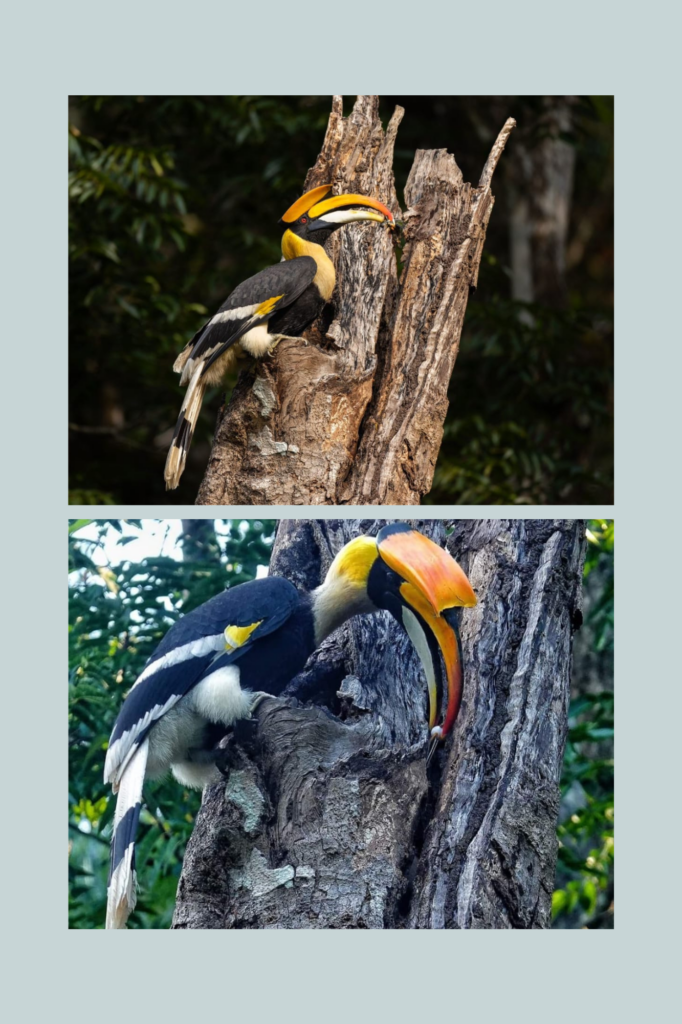 Breeding season brings new behaviors to light: exploring the carnivorous side of hornbills in their natural habitat. (Nelliyampathi reserve forest, western ghats, Kerala)
Breeding season brings new behaviors to light: exploring the carnivorous side of hornbills in their natural habitat. (Nelliyampathi reserve forest, western ghats, Kerala)
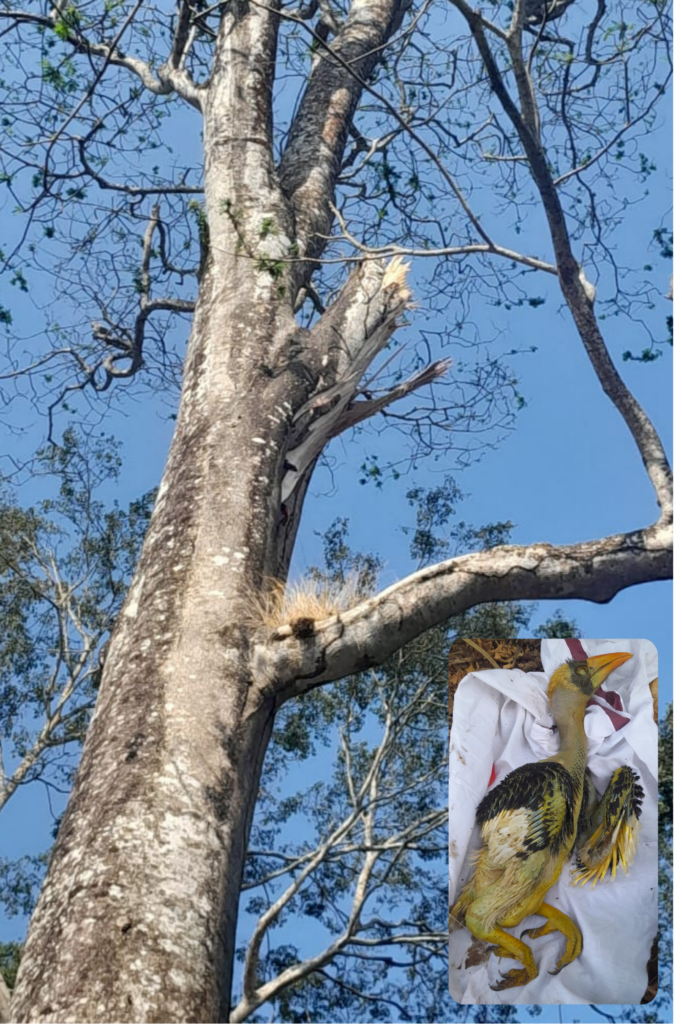 Heart-breaking yet vital: examining a fallen nest and a deceased hornbill—a reminder of the fragility of life in the wild.
Heart-breaking yet vital: examining a fallen nest and a deceased hornbill—a reminder of the fragility of life in the wild.
Challenges I have faced..
Fieldwork, while rewarding, can be physically demanding and logistically challenging. Navigating remote and dense forest areas, dealing with harsh weather conditions, and ensuring the safety of both the research team and the equipment can be quite taxing. For instance, during one of my field trips, I encountered sudden rain, making it difficult to continue observations and record accurate data. Collecting reliable data on bird populations and behaviors requires meticulous planning and execution. Birds are highly mobile, and their presence can be unpredictable, making consistent data collection challenging.
Additionally, analyzing large datasets to derive meaningful conclusions can be time-consuming and complex, requiring advanced statistical skills and software proficiency.
Securing adequate funding for research projects is a common challenge in the field of ornithology and wildlife conservation. Implementing conservation measures and ensuring their success often face practical and bureaucratic hurdles. Working with various stakeholders, including government agencies, NGOs, and local communities, requires diplomacy and persistence. The slow pace of policy implementation and the complexity of ecological issues add to the challenges. Despite these challenges, each obstacle has provided valuable learning experiences and has contributed to my growth as a researcher and conservationist. Overcoming these difficulties has strengthened my resolve and commitment to making a meaningful impact in the field of ornithology and wildlife conservation.
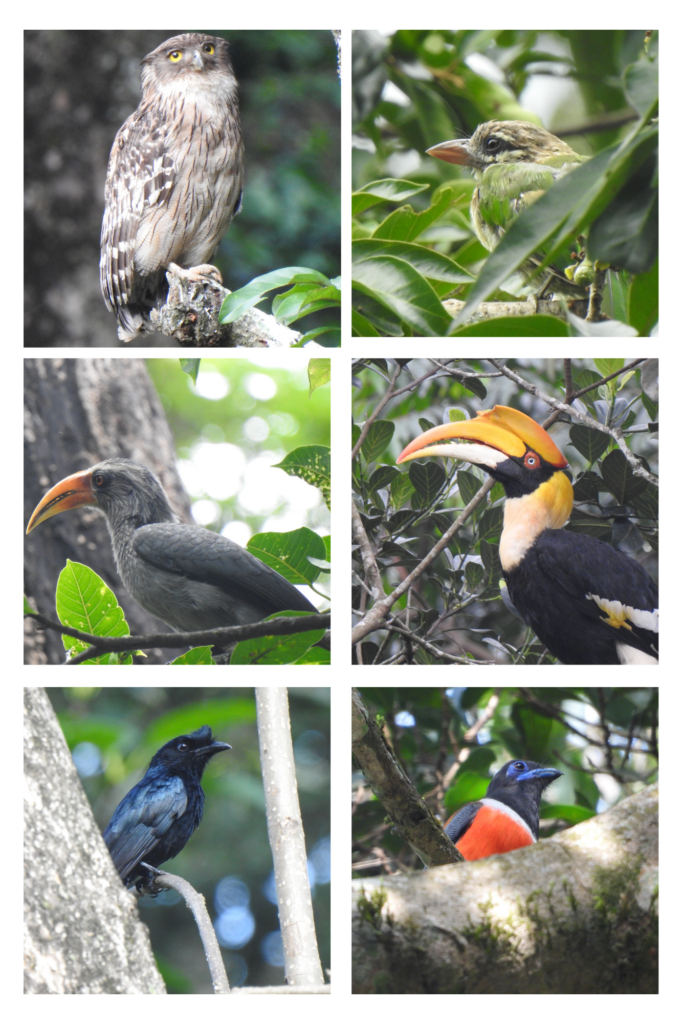 Eyes that tell a thousand stories: a close-up look at the captivating gaze of our feathered friends.
Eyes that tell a thousand stories: a close-up look at the captivating gaze of our feathered friends.
My advice for young researchers is….
Here’s some advice for young researchers in ornithology, outlining what one should and should not do to pursue a successful career in this field:
Should Do:
- Follow Your Passion: Be genuinely interested in birds and their ecology. Passion drives perseverance, especially during challenging times.
- Gain Field Experience: Spend as much time as possible in the field. Practical experience is invaluable and helps develop essential skills in observation, data collection, and species identification.
- Build a Strong Foundation: Develop a solid understanding of ornithology, ecology, and conservation biology through formal education. Take relevant courses and engage in independent reading.
- Learn from Mentors: Seek guidance from experienced ornithologists and researchers. Join research projects and internships to gain insights and hands-on experience.
- Develop Technical Skills: Learn to use tools and technologies such as binoculars, GPS devices, remote sensing equipment, and statistical software. Proficiency in these tools enhances research accuracy and efficiency.
- Network and Collaborate: Attend conferences, workshops, and seminars to meet other researchers and professionals in the field. Collaboration can lead to valuable partnerships and opportunities.
- Contribute to Science: Publish your research findings in scientific journals. Sharing your work contributes to the scientific community and enhances your professional reputation.
- Engage with Local Communities: Educate and involve local communities in conservation efforts. Building local support is crucial for the success of conservation projects.
- Stay Updated: Keep up with the latest research and developments in ornithology and conservation biology. Continuous learning is essential for staying relevant and effective in your work.
- Be Patient and Persistent: Research can be slow and sometimes frustrating. Patience and persistence are key to overcoming obstacles and achieving long-term success.
- Avoid Shortcuts: Do not take shortcuts in your research methods or data collection. Scientific integrity is paramount, and reliable data is the cornerstone of credible research.
Should not do:
- Do not neglect safety: Fieldwork can be physically demanding and sometimes dangerous. Always prioritize safety for yourself and your team.
- Do not Ignore Ethical Considerations: Always follow ethical guidelines in your research, including humane treatment of birds and respecting their habitats.
- Do not Work in Isolation: Avoid working in isolation. Collaborate with other researchers and engage with the broader scientific community. Sharing knowledge and experiences enriches your work.
- Do not Underestimate the Importance of Communication: Effective communication of your research findings to both scientific and general audiences is crucial. Do not underestimate the value of writing clearly and presenting your work compellingly.
- Do not Ignore Funding and Resource Management: Do not overlook the importance of securing funding and managing resources effectively. Be proactive in applying for grants and managing your budget efficiently.
- Do not Be Discouraged by Setbacks: Research often involves setbacks and failures. Do not let these discourage you. Use them as learning experiences and continue moving forward.
- Do not Overlook the Importance of Conservation: Remember that the ultimate goal of many ornithological studies is conservation. Do not focus solely on academic achievements; aim to make a tangible impact on bird conservation.
- Do not Disregard Local Knowledge: Do not ignore the insights and knowledge of local communities and indigenous peoples. Their understanding of local ecosystems can be invaluable to your research.
- Do not Rush Publication: Avoid rushing to publish without thoroughly analyzing your data and ensuring your conclusions are well-supported. Quality is more important than quantity in scientific research.
By following these guidelines, young researchers can build a strong foundation for a successful career in ornithology and make meaningful contributions to the field and to bird conservation.
SANTHWANA A
[email protected]
PhD Research Scholar,
Kongunadu Arts and Science College, Coimbatore
Linkedin profile
Researchgate profile

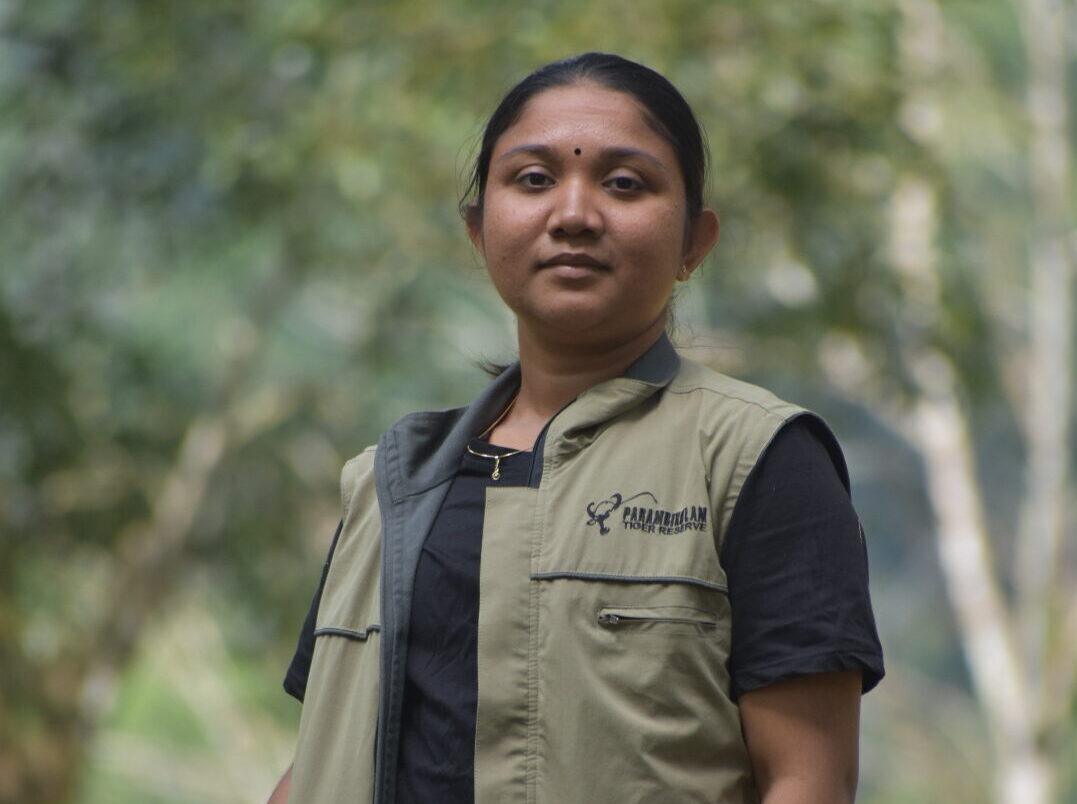
Your passion for birds and photography shines through so beautifully in your work! It’s inspiring to see how you’re combining your love for nature with research, capturing both beauty and knowledge. Keep soaring high dear !!
thankyou for your words
Congratulations..so proud of you Santhwana
Thank you so much Balaji for your words and support.
Hats off to.. my lady💯..
thankyou my lady
ഞാൻ വളരെ സന്തോഷവാനാണ്, ഈ രംഗത്ത് കൂടുതൽ വളരാൻ ആഗ്രഹിക്കുന്നു…🌾🙌👏👏
Thankyou so much
ഞാൻ വളരെ സന്തോഷവാനാണ്, ഈ മേഖലയിൽ ഇനിയും വളരട്ടെ എന്ന് ആശംസിക്കുന്നു…🌾
Congratulations Santhwana! Wishing that your passion make way for greater heights!
Thankyou so much
Happy and thrilled reading a passion driven research story.
Sure you will conquer the lovely woods with a birds’eye in coming days. All the best…
thankyou so much for your words
Proud of you! Onwards and upwards Santhwana. #womeninscience
Thankyou my dear..
Truly amazing journey. Wishing success in every step of your venture.
thankyou so much